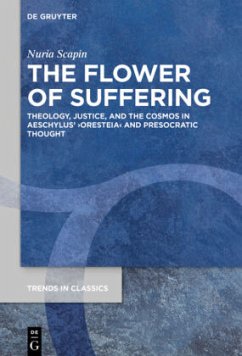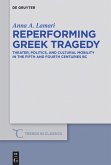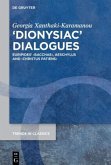Greek tragedy occupies a prominent place in the development of early Greek thought. However, even within the partial renaissance of debates about tragedy's roots in the popular thought of archaic Greece, its potential connection to the early philosophical tradition remains, with few exceptions, at the periphery of current interest. This book aims to show that our understanding of Aeschylus' Oresteia is enhanced by seeing that the trilogy's treatment of Zeus and Justice (Dikê) shares certain concepts, assumptions, categories of thought, and forms of expression with the surviving fragments and doxography of certain Presocratic thinkers (especially Anaximander, Xenophanes, Heraclitus, and Parmenides). By examining several aspects of the tragic trilogy in relation to Presocratic debates about theology and cosmic justice, it shows how such scrutiny may affect our understanding of the theological 'tension' and metaphysical assumptions underpinning the Oresteia's dramatic narrative. Ultimately, it argues that Aeschylus bestows on the experience of human suffering, as it is given in the contradictory multiplicity of the world, the status of a profound form of knowledge: a meeting point between the human and divine spheres.
Hinweis: Dieser Artikel kann nur an eine deutsche Lieferadresse ausgeliefert werden.
Hinweis: Dieser Artikel kann nur an eine deutsche Lieferadresse ausgeliefert werden.
"It undoubtedly makes an important contribution to Aeschylean studies and opens up the way for more progress in this regard." Emmanuela Bakola in: BMCR 2021.03.16.
"In sum, The Flower of Suffering represents a serious advance in our understanding
of the intellectual context in which Aeschylus composed the Oresteia
and offers up an invitation for additional research into the sphere of Presocratic
philosophy and Greek tragedy that, it is to be hoped, will soon be taken up
by scholars." K. Scarlett Kingsley in: Polis: The Journal for Ancient Greek and Roman Political Thought, 2022.
"In sum, The Flower of Suffering represents a serious advance in our understanding
of the intellectual context in which Aeschylus composed the Oresteia
and offers up an invitation for additional research into the sphere of Presocratic
philosophy and Greek tragedy that, it is to be hoped, will soon be taken up
by scholars." K. Scarlett Kingsley in: Polis: The Journal for Ancient Greek and Roman Political Thought, 2022.








